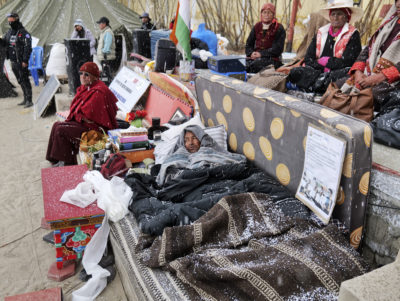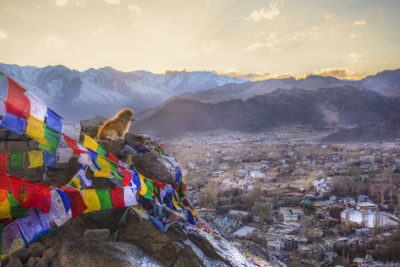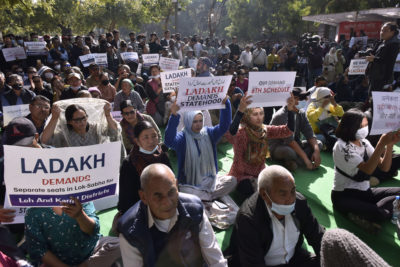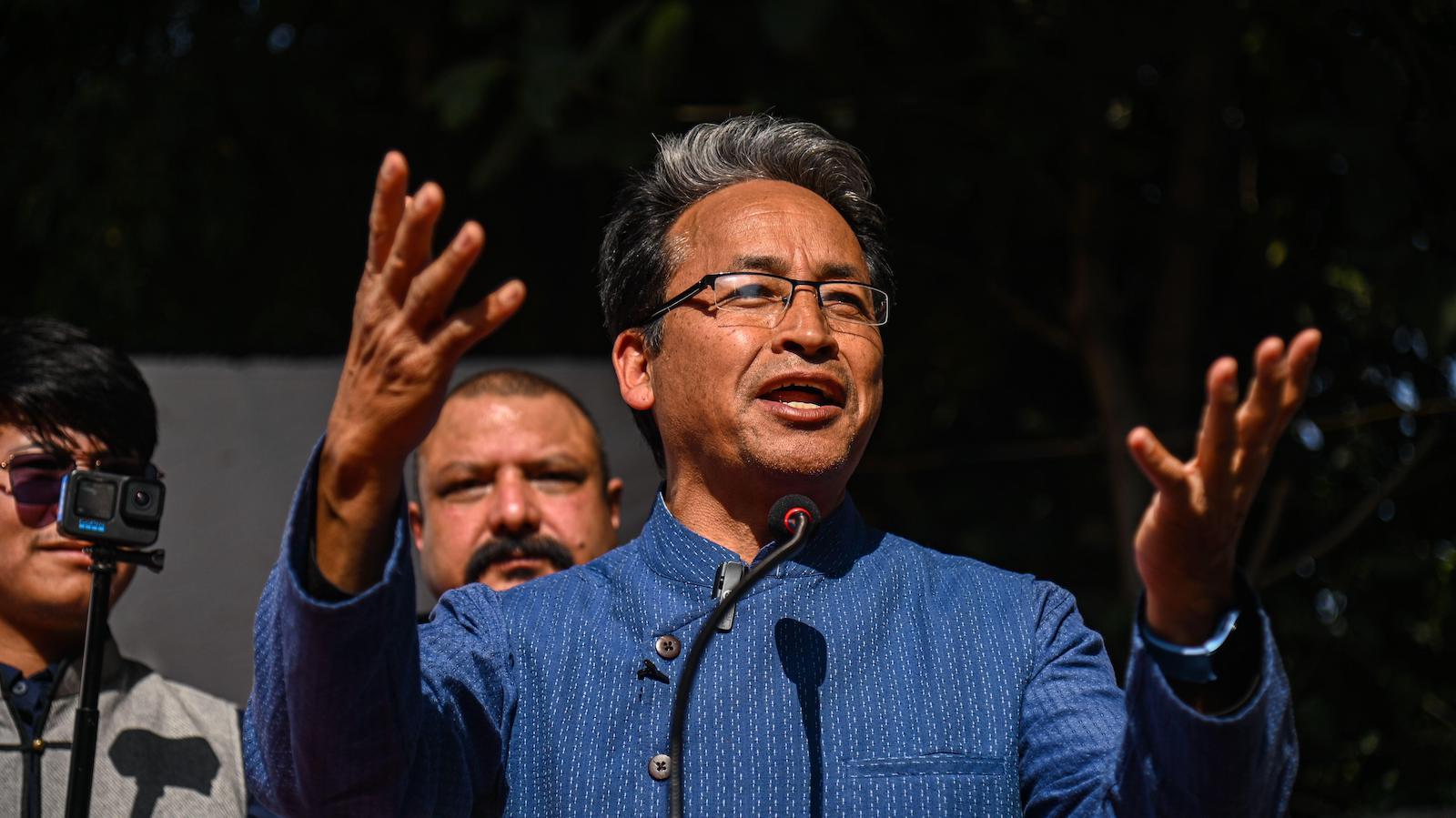This month, Indian activist Sonam Wangchuk carried out a 21-day “local weather quick” in his native Ladakh within the Himalaya. He had two goals: to name the world’s consideration to the speedy meltdown of the planet’s “third pole” and to stress India’s authorities to grant Ladakhis the facility to legally shield the area’s assets.
For hundreds of years, Ladakhis have survived and thrived within the “rain shadow” of the Himalaya, the place the one water comes from melting snow and ice. However in current a long time, they’ve witnessed speedy glacier loss, more and more erratic snowfall, and disasters attributable to unprecedented cloudbursts and glacial lake floods.
An educator and an engineer, Wangchuk has pioneered the development of passive solar-heated buildings all through the area, in addition to “ice stupas,” during which meltwater is refrozen for later irrigation use. However he’s painfully conscious such efforts can’t resolve the larger downside, which is why he has turn into certainly one of India’s most distinguished voices for local weather motion.
For 3 weeks, Wangchuk, whom Yale Surroundings 360 interviewed on day 19 of his quick, consumed solely water and salt and slept outdoor at 11,500 toes in subfreezing temperatures. 1000’s joined him in their very own day-long fasts and in mass protests within the Ladakhi capital to name on Prime Minister Narendra Modi’s authorities to designate Ladakh as a “tribal space” underneath a provision of India’s structure, which might assure native autonomy over land use and useful resource administration. Entrusting Ladakhis with this authority, says Wangchuk, is the one approach to shield this fragile, cold-desert ecosystem and Ladakhis’ lifestyle.
“In Ladakh, we’re in a vital place to be messengers from the frontier,” he says. “Now we have a duty… to inform the world what’s taking place with us immediately, and that tomorrow will probably be taking place to you.”

Sonam Wangchuk is surrounded by supporters on the seventeenth day of his starvation strike, March 22, 2024.
Sonam Dorje / AP Picture
Yale Surroundings 360: You are actually on day 19 of your 21-day quick. How are you feeling?
Sonam Wangchuk: Final two days, I used to be feeling very weak. Right this moment I used to be feeling significantly better.
e360: How would the authorized safeguards you might be in search of — akin to having your individual legislative autonomous district councils — assist shield the glaciers of the Himalayas and the ecosystems and communities that depend on them?
Wangchuk: There’s a particular provision within the Indian structure known as the Sixth Schedule, which provides safeguards to areas the place tribal communities are the bulk, to the folks and their cultures, in order that they’ll decide how these locations must be developed with out interference from others.
What we’re demanding — and what the federal government had promised — is the supply of autonomy to the Indigenous Ladakhi folks. The Sixth Schedule offers for the formation of autonomous district councils which have legislative powers; they’ll make guidelines and laws governing land, forest, water, agriculture, well being, sanitation, mining, and extra. However after the ruling Bharatiya Janata Social gathering received within the elections, it backtracked on these guarantees.
“Over my lifetime, I’ve seen glaciers vanish. Glaciers that was once proper subsequent to roads have retreated lots of of meters.”
e360: Within the absence of those protections, what future types of industrial improvement by exterior pursuits are folks in Ladakh frightened about? Are there particular proposed tasks that concern you probably the most?
Wangchuk: With out these protections, Ladakhis themselves might be fully excluded from decision-making round land use in their very own land. Outsiders will be capable of are available with enormous mining, power, industrial tasks, and we could have no say within the matter. There will likely be no native enter, no limits on how these large tasks are determined and constructed.
If Ladakh is left open to this sort of free-for-all, with no safeguards, mining firms will certainly come. We hear reviews that they’re already scouting within the mountains and valleys. Big lodge chains are additionally keen to come back right here. There merely received’t be sufficient water in our high-altitude desert to help these new calls for. Each drop right here is vital. The tourism business has already induced loads of havoc when it comes to air pollution and water use. What folks worry is that with out these protections our tradition and our lifestyle — which has been finely tuned over hundreds of years to outlive in these mountains, in stability with the assets and the atmosphere — we received’t be capable of maintain it.
After which there will likely be extra and larger roads to serve all of this new improvement, with extra diesel vans and automobiles plying them. All of this exercise will result in extra native emissions of black carbon — soot — and we all know that this may make the glaciers disappear even quicker. As a result of when the soot falls on the snow and ice, it absorbs photo voltaic power, heating them and dashing up their melting.

Leh Metropolis, the biggest metropolis in Ladakh.
Sonam Dorje / AP Picture
e360: Ladakh lies within the rain shadow of the Himalaya, the place nearly all the water provide comes from snow and ice. How frightened are Ladakhis about their future means to proceed to farm and dwell within the area if these warming and glacial-loss tendencies proceed?
Wangchuk: Over my lifetime, I’ve seen glaciers vanish right here in Ladakh. Glaciers that was once proper subsequent to the roads have now retreated lots of of meters. These adjustments have led to flash floods in some locations, drought elsewhere. We’re already dealing with water shortages in some areas. If new industries are available, with their very own calls for for water and with air pollution, not solely will the native folks endure, however all of North India will endure. That’s why we take into account it so vital to protect these glaciers. When the glaciers disappear, the native folks in Ladakh will turn into refugees, as a result of they’re our lifeline.
However this doesn’t solely have an effect on us in Ladakh. Ladakh and its glacier system is [part of what is] referred to as the “third pole” of the planet. It’s the biggest reservoir of contemporary water exterior of the poles, feeding one fourth of the planet’s inhabitants, instantly or not directly. It’s not simply Ladakh’s downside. It’s all people’s downside.
“My attraction all the time to folks out there’s, please dwell merely in your large cities, so we within the mountains could merely dwell.”
e360: Have you ever been inspired by the response to your quick from different components of India?
Wangchuk: Sure. I’ve been highlighting these points and educating folks in India — whereas additionally reminding the federal government of the guarantees they’ve made — by my morning and night updates [on social media] all through the quick. Many individuals from northern India particularly, the Himalayan foothills, and the remainder of India have been moved and have expressed solidarity with us. Undoubtedly there’s a giant change. Some have even organized one-day fasts in their very own cities. Final Sunday it was 25 cities round India. That’s a sign of how a lot they’re moved, and they’re in help. Individuals have come from Darjeeling, Uttarakhand, all of the Himalayan foothills, and plenty of different locations.
e360: Whether or not or not the federal government responds to your calls for, what do you suppose your quick and the associated protests have already achieved?
Wangchuk: What I feel we’ve got achieved is educating the nation across the causes for the quick. However fairly than preserving it as simply one thing we acquire for our trigger, I’ve been making an attempt to coach them about how the glaciers are melting, how companies are unsustainably exploiting the mountains. It’s about schooling. That has undoubtedly occurred, even when the [political] calls for will not be met.
Plenty of networks and connections are being made, and the federal government takes it significantly —though they’re making an attempt to keep away from it for now. However eventually I feel they’ll have to concentrate. As a result of it’s making a dent of their votes.

Protestors in New Delhi demanding statehood for Ladakh, February 2023.
Sonu Mehta / Hindustan Occasions through Getty Pictures
e360: America and different rich nations bear a lot of the historic duty for fossil gas emissions driving the melting of Himalayan glaciers. Provided that truth, is your quick supposed to talk to folks past the borders of India too?
Wangchuk: Sure, my local weather quick is simply as a lot to coach the large cities of the world, the place most of this downside begins, and the traditionally accountable nations. However I need to say, I’m not a type of who blames the wealthy historic emitters after which takes a concession for the growing world to emit extra, “as a result of now it’s our share, why shouldn’t we emit as you will have already?” I don’t consider in that. One thing that’s toxic and dangerous to the planet — the earlier we be taught and act, the higher.
We don’t should repeat the errors made by earlier powers. Now we have to set issues proper in our personal particular person capacities. We are able to’t be doing the identical, or else there will likely be no distinction between us who declare we perceive the problems of atmosphere and those that didn’t know on the time and did what they thought was proper. However, sure, the large emitters have a giant duty additionally, and I wish to connect with them within the U.S. and Europe and different nations to attraction on to the folks.
e360: Do you will have a message to folks in the USA and different industrialized nations about their position in serving to shield the Himalaya?
Wangchuk: To make their life less complicated. To change from carbon-intensive life to greener life, as a result of it harms the planet and themselves, later. However a lot sooner we Ladakhis — for no fault of ours — will turn into victims of their acts. So, my attraction all the time to folks out there’s, please dwell merely in your large cities, so we within the mountains could merely dwell. I wish to affect folks past the borders of India, as a result of emissions don’t know any boundaries, and air pollution doesn’t know any boundaries. And since schooling is one of the best protection.
This interview was edited for size and readability.
